
Storage media come in all shapes and sizes, such as USB sticks, SSDs, NAS or cloud storage services. New is the Cubbit Cell, read in this preview whether this is a new gadget or the beginning of a worldwide distributed cloud storage without a central data center.
By Arnold van Overeem
Reports regularly surface from storage media that are said to be faster, better and more convenient than what has been on the market so far. Usually these are USB sticks, with or without software to import photos, or with cryptographic functions, or external HDDs or SSDs that are faster, cheaper or more compact than their predecessors. All these gadgets have in common that they can only be used on one PC, laptop, tablet or smartphone at a time. And the exchangeability of data is often limited to devices of approximately the same type, or at least with the same software support. If you don’t want that, ie being able to access the same data with multiple devices/users at the same time, you had two options until now: a cloud storage service or a NAS.
Cloud storage service: advantages and disadvantages
A cloud storage service is, for example, Google Drive, iCloud Drive from Apple or Microsoft OneDrive or a comparable service from independent providers such as Amazon, Hidrive (Strato) or Dropbox. Cloud storage services have free plans with limited storage capacity or you pay a monthly fee that quickly adds up if you want several terabytes of storage capacity. The advantage of a cloud storage service is that the backup is usually well organized. The downside is that your data is kept in a data center, which may be subject to different legislation, so you always run the risk that others can access your data, or that you can suddenly no longer access it yourself. The latter happened to users of OneDrive who had stored family photos of their children in the bath in their own cloud space and Microsoft subsequently blocked their account, due to suspicion of child pornography, which also prevented them from accessing their computers.
NAS
A NAS is a proprietary device that, in addition to the one-time purchase expense, offers almost unlimited storage capacity, reliability through redundancy via RAID, but is dependent on a place in the house and a bit of continuous power consumption. And you have to arrange backups yourself. And if you want to access it remotely, you need to have the knowledge to set up your own VPN. Some well-known brands are QNAP, Synology, Asustor or Drobo, or you can equip your router with a USB-connected hard disk.
Cubbit Cell
A number of students at the University of Bologna thought they could come up with something better and have started something new with investments from a number of major parties, including the European Commission, Barclays Bank and the Italian telecom provider TIM. They called this The Swarm and the analogy with a swarm of bees has been thoroughly thought through. Joining the Swarm involves purchasing a hexagonal box called Cubbit Cell, which contains a hard drive and a sealed Linux-based piece of software.
You connect the box to your router with a patch cable, create an account with Cubbit on your PC or Mac and you claim your box with your account (via the local IP address). Then you have a cloud storage of 500 GB or more. Except for the one-time purchase, there are no costs involved and no knowledge is required. The data that you want to store in the Swarm is redundantly distributed via peer-to-peer protocols among 24 other Cubbits spread across the world, in such a way that the data can be reassembled from each 16 of these 24. And when one or more of the 24 Cubbits are lost, the system itself replenishes up to 24 with other Cubbits elsewhere in the world. Your Cubbit is therefore also used by an unknown number of other Cubbit users.
Review
In the coming weeks/months I will extensively test the Cubbit and let you know via a review whether this is just a new gadget, or the beginning of a worldwide distributed cloud storage without a central data center. More info: https://www.cubbit.io
Pros
✔ Full custom control over your stored data
✔ No monthly fees
✔ Large storage capacity (4 TB per account)
Negatives
– a promise for the time being, the value of which has yet to be proven
– Android and iPhone (mobile) device support still in the pipeline
– not all promised features are available in the start-up phase (chicken-or-egg issue)